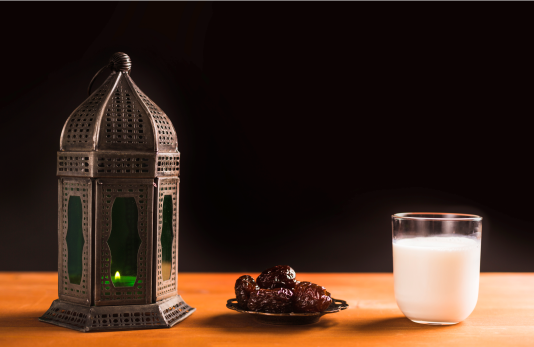“Break the fast with water and dates at iftar times.”
Well, you’re probably familiar with this prophetic tradition.
It’s not just a customary practice; it’s also a healthy choice that energizes you after a day of fasting.
Whereas, it might be tempting to munch on those samosas, bhajis, and snacks. They taste good, but they’re not exactly the healthiest option for a balanced Ramadan diet.
The key to staying healthy and energetic during the month of Ramadan is to focus on balanced eating, keeping yourself hydrated, and staying active.
Here are some frequently asked questions about Ramadan fasting that can help you maintain a healthy approach during this holy month.
1. Is Fasting During Ramadan Good For Health?
Ramadan fasting is an annual Islamic practice that isn’t just about self-discipline; it’s got some health benefits too.
For the whole month of Ramadan, Muslims fast from sunrise to sunset.
Studies have shown that fasting during Ramadan can help lower blood cholesterol, blood pressure, and blood sugar levels.
Additionally, it’s like a natural detox for your body, flushing out all those harmful toxins and giving your digestive system a break.
Those health benefits are perpetuated throughout the year.
Certainly, it’s important to be smart about it. You can’t just fast all day and then eat unhealthy meals at night.
It’s all about balance, making sure you’re eating nutritious meals, and staying hydrated during non-fasting hours.
2. What Is A Healthy Diet For Ramadan?
Going long hours without eating sucks more energy. So eating well for suhoor and iftar helps to keep you healthy, and you will not feel tired.
Eating well doesn’t mean eating too much. Both are different.
Choose foods high in
- Protein (eggs, chicken, fish, beans)
- Carbohydrates (whole-grain food items)
- Healthy fats (nuts and seeds)
- Fruits (oranges, cucumbers, and watermelon)
- Veggies
- Fluid-rich foods (soups and juices)
Suhoor Tips
Suhoor fuels up for the day ahead and helps to maintain energy till iftar.
It’s best to eat as close as possible to the sunrise. For instance, if the sun rises around 6:30 AM, aim to have your suhoor between 5 AM and 5:30 AM.
Never SKIP it!
Listen to your body’s hunger & fullness cues and adjust the portion size of the meals you eat accordingly to avoid overeating.
Drink enough water to stay hydrated during the day, and avoid sugary and processed foods that can cause you to slow down.
Iftar Tips
When it’s time to break the fast, choose two glasses of water, which is the best way to hydrate yourself after a day of fasting.
Followed by, Dates are a good choice to ease back into eating and go for a balanced meal. If you’re craving snacks or juicy items, choose fresh juices (without sugar or with less sugar), yogurt, or salads.
And timing matters the most too.
Try to have your dinner as close as possible to the sunset. For instance, if the sun sets at 6:30 PM, aim to have your iftar between 6:30 PM and 7 PM.
Keep it light, enjoy your meal, and savor the moment of breaking your fast with your family!
3. How can I prevent dehydration while fasting during Ramadan?
Indeed, Ramadan coincides with the summer months, which can raise concerns about dehydration because of higher temperatures and not eating for long hours.
To prevent dehydration, drink an adequate amount of water, especially at suhoor and iftar. Skip the caffeinated and sugary beverages, which would dehydrate your body when consumed in excess.
If you’re looking for a tasty option to hydrate, you could prefer soups and smoothies.
Beat the heat and stay hydrated in Ramadan.
4. Can I Exercise While Fasting During Ramadan?
Yes, you can.
Fasting can make you feel a bit low on energy, but that doesn’t mean you have to spend the whole day on the couch. You can still get moving!
However, consider decreasing the duration and, most importantly, the intensity of the exercise compared to what you usually do to ensure you’re not pushing yourself too hard to be active.
Go for a leisurely walk, maybe try yoga, or simply do some gentle stretches. Choose the one that matches your energy levels.
But here’s the golden rule: Listen to your body! Pay attention to how you’re feeling during your workout. If you start feeling parched or too tired, take a rest and move at your own pace.
5. Which Are The Best Times To Do Exercises During Ramadan Fasting?
Everyone’s fitness schedule varies, and the general schedule for workouts during Ramadan is either just before suhoor (a pre-dawn meal) or after iftar (a meal that breaks the fast), when energy levels tend to be higher.
Before Suhoor: This is a good option if you’re looking to lose weight. Moreover, you’ll be less likely to get dehydrated, and it’s perfect for those who wake up early. Exercise before suhoor allows you to fuel your body for the day ahead and can help kickstart your metabolism.
After Iftar: Another option is to exercise after breaking the fast, but before dinner. This can be the easiest workout schedule for many people. If following this schedule, it’s important to finish the iftar right after sunset.
Adjusting your fitness routine to align with these times can help you maintain a consistent exercise regimen while fasting.
6. Are There Any Health Risks Associated With Fasting During Ramadan?
For those with diabetes, pregnant or breastfeeding women, the elderly, and people with certain medical conditions, fasting might not be the best idea. It’s essential for these individuals to consult medical experts before fasting and to monitor their health closely during Ramadan.
Regardless of these, if you start feeling dizzy or weak for a prolonged period, it’s better to consult a physician.
Have a word with our internal medicine physician to clarify your concerns for personalized advice and make sure you’re on the right track for a healthy Ramadan.

